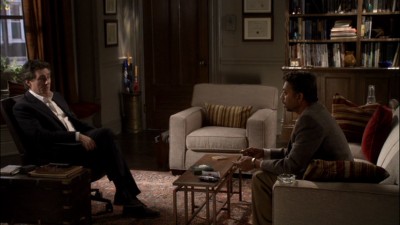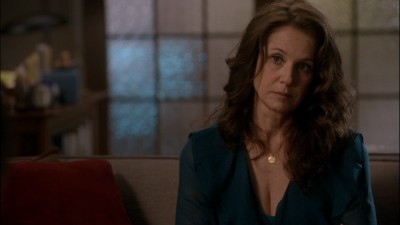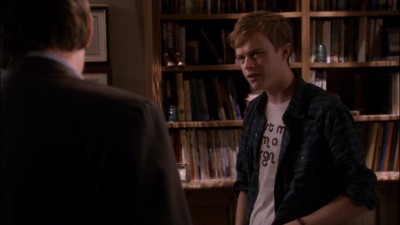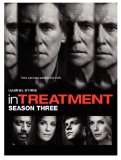| Reviews & Columns |
|
Reviews DVD TV on DVD Blu-ray 4K UHD International DVDs In Theaters Reviews by Studio Video Games Features Collector Series DVDs Easter Egg Database Interviews DVD Talk Radio Feature Articles Columns Anime Talk DVD Savant Horror DVDs The M.O.D. Squad Art House HD Talk Silent DVD
|
DVD Talk Forum |
|
|
| Resources |
|
DVD Price Search Customer Service #'s RCE Info Links |
|
Columns
|
|
|
In Treatment: The Complete Third Season

Watching the excellent third season of HBO's In Treatment may just be enough to push you over the edge and onto the couch yourself. It's not just that this will be the last time we'll ever get the chance to follow along as psychoanalyst Paul Weston (Gabriel Byrne, in perhaps the best role of his career after Miller's Crossing) tries to help another group of patients better understand themselves and their situations in often intense weekly sessions, as HBO announced the show's cancellation not long after this season began airing. It's also that this season finds Dr. Weston at his deepest, darkest point yet, fighting tooth and nail to hold on to his belief in the validity and usefulness of his vocation as he faces what is in many ways his most recalcitrant, difficult, impenetrable group of analysands yet.
When we left Dr. Weston at the end of season two, his treatment had ended with Gina Toll (Dianne Wiest), a long-term colleague and former supervisor with whom he had a long-running, tempestuous professional and (platonic) personal relationship. Now, Gina has published a novel with a central character that Paul sees as a thinly veiled, very unflattering representation of himself. On the pretext of just wanting an Ambien prescription filled to combat the sleeplessness he is experiencing due to Gina's book and other anxieties (including a devastating worry over what appear to be symptoms of Parkinson's disease, which his father died of in the second season), he finds himself in the office of Adele (Amy Ryan, Gone Baby Gone) a younger, very confident fellow therapist who immediately rubs Paul the wrong way, but who is able to convince him--perhaps partly due to what becomes increasingly clear is Paul's attraction to her--to continue his analysis with her in Gina's absence. And Paul needs all the help he can get because, in addition to his fears for his own health and his familial insecurities as a divorced dad, he has some exceptionally challenging patients this time around.

Paul's Monday appointment is Sunil (Irrfan Khan, A Mighty Heart, The Darjeeling Limited), a recently widowed middle-aged Indian gentleman who has been forced to relocate from Calcutta to New York to live with his doctor son, his American daughter-in-law, and his grandchildren. After his withdrawn, creepy behavior begins to alarm his family--especially his daughter-in-law, toward whom he has a suspicious intensity of ill feeling--Sunil is brought to Dr. Weston, who has the task of drawing out and helping this proud but lost man adjust to a culture and family situation that seem to bewilder and offend him at every turn. The Tuesday regular is Frances (Debra Winger, whose role here after her encouraging comeback turn in Rachel Getting Married means a real quality resurgence for her career), a famous but fading actress and sister of a long-ago patient of Paul's, who has taken a role in a stage play but is having trouble remembering her lines, a problem probably not unrelated to her knotty relationship with her sister (Paul's former patient), who is dying of cancer, and with her daughter, who despises what she sees as her movie-star mother's incurable narcissism and vanity. Finally, Paul's Wednesday is Jesse, 16 years old and gay, whose self-loathing and tensions with his adoptive parents over his reckless behaviors are pushed to the breaking point when his birth mother contacts him out of nowhere, opening floodgates of confusion and emotion that Paul has to prevent from drowning the outwardly cocky and defiant but inwardly fearful and uncertain young man.

Meanwhile, Paul receives tough love at the highly skilled, unfailingly professional hands of Adele, who is critical of Paul's bygone therapy with the coddling and enabling (by comparison) Gina. Sparks often fly as Adele ruthlessly challenges Paul to really look at his own life and what she sees as his bad habits both in his personal relationships and in his rapport with his patients. The overarching question that comes to define season three is this: If Adele is confident, happy, fulfilled, and imperturbable in her work, and fully in control of the perpetually tested boundaries that always exist between therapists and patients, what does that make Paul, whom we have seen time and again veer toward ethical gray zones by becoming over-invested in his patients? And if Paul is in a place where he--whether out of loneliness, fear, and his growing skepticism of the usefulness or realism of the psychoanalytic process--cannot be the effective, self-disciplined therapist that Adele is, and finding the idea of such necessary detachment repugnant, what does that mean for his own future as a therapist, as a patient, and as an affective being with neglected emotional needs of his own? In Treatment stays true to its strengths by refusing to provide a pat answer to any of those questions, instead allowing us to see and feel their urgency at the same time it accepts the ambiguous decisions in and outcomes of everyone's treatment, especially Paul's, whose expressed intentions in the series's final moments are decisive but have impossible-to-predict consequences, ensuring that our concern for his fate will keep disturbing and moving us long after the end credits have rolled for the last-ever time.

The quality of In Treatment--developed and produced for HBO by Rodrigo Garcia (director of Mother and Child and son of Latin America's best-known novelist, Gabriel Garcia Marquez) after an Israeli series, Be'Tipul--stays uniformly high over all three of its seasons. Garcia hires on, always, wonderful writers (season three's scribes include Capote screenwriter Dan Futterman and Namesake novelist/Pulitzer prizewinner Jhumpa Lahiri) and directors (Jim Mckay (Hung), Courtney Hunt (Frozen River)); and although the voyeuristic thrill of being the privileged spectator of such a sacredly private experience as a therapy session is innate to the show's appeal, humaneness and an overpoweringly astute intelligence trump sensationalism every time, and not for a millisecond is In Treatment ever exploitative. Finally, the show's subtle but extremely fine visual sensibility should not be overlooked; it turns out that a therapist's office, already a site with dramatic potential if there ever was one, also makes for a very cinematic interior set, and the level of creativity and real comprehension of the stories' needs at which the cinematographers and editors work with light, framing, mise-en-scène, and montage means that every episode has something of the visual aura from a Bergman film, with all the potential for visually-evoked and -underscored emotional complexity and profundity that implies. We still have Mad Men, and I hear great things about Treme and Breaking Bad, but In Treatment was, like them, the kind of rich, artistically ambitious entertainment that puts most theatrically-released dramatic films to shame. You can never have enough of those, and this one will be sorely missed.
THE DVDs:
The anamorphic-widescreen transfer on these four discs is perfect. In Treatment series has some subtly nuanced visuals, a muted color palette and a shadowy lighting scheme in which every little distinction in shade is important, and of course skin tones could not be more vital when we're spending this much time looking at faces. It all comes through beautifully clear, with no glitches and with all that unexpected, thrillingly cinematic texture intact.
Sound:A series that takes place almost exclusively inside the four walls of a therapist's office does not place very high demands on sound design or its delivery on DVD, but the sound is still crucial, and these discs' Dolby Digital 5.1 soundtrack is flawless. It's all fairly straightforward, if nicely done--center speaker for dialogue, rear speakers coming alive only for the very rare use of the show's score, and for room noise or distant, vague traffic sounds--but it sounds great, with no audio flaws whatsoever.
Extras:None.
FINAL THOUGHTS:It is very sad to see In Treatment end, but this third and final season makes a worthy wrap-up to one of the best TV programs in recent memory. Troubled, torn, eminently sympathetic psychoanalyst Paul Weston faces his most challenging batch of patients and his most wrenching personal journey yet this time around, and it is as compelling, riveting, and sometimes deeply moving as we've come to expect from the equally great prior seasons. Rarely has a show afforded viewers the opportunity to invest quite this deeply and intimately in the skillfully, compassionately depicted conflicts and aspirations of its characters, while at the same time keeping any sense of an assured, fixed understanding of them only a tantalizing but ever-elusive and never guaranteed possibility. That means you'll probably want to just book a weekend with the blinds drawn when you settle in with Dr. Weston, his therapist, and his patients; these sessions are that addictive. Highly Recommended.
|
| Popular Reviews |
| Sponsored Links |
|
|
| Sponsored Links |
|
|
| Release List | Reviews | Shop | Newsletter | Forum | DVD Giveaways | Blu-Ray | Advertise |
|
Copyright 2024 DVDTalk.com All Rights Reserved. Legal Info, Privacy Policy, Terms of Use,
Manage Preferences,
Your Privacy Choices | |||||||













